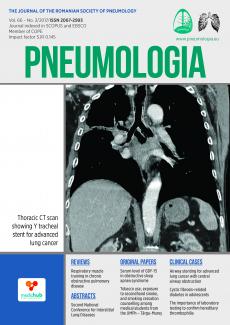The role of smoking in changing essential parameters in body homeostasis
Abstract
Andreea Cristiana Didilescu1, Stela Carmen Hanganu2, Nicolae Galie1, Maria Greabu3, Alexandra Totan3, stefan Ioan Stratul4, Ligia Puiu51 Catedra de Anatomie si Embriologie, Facultatea de Medicina Dentara, UMF „Carol Davila", Bucuresti
2 Disciplina de Stomatologie Comunitara, Facultatea de Medicina Dentara, UMF „Gr.T.Popa", Iasi
3 Catedra de Biochimie, Facultatea de Medicina Dentara, UMF „Carol Davila", Bucuresti
4 Catedra de Parodontologie, Facultatea de Medicina Dentara, UMF „Victor Babes", Timisoara
5 Spitalul de Pneumoftiziologie, Baia Mare
Contact : Andreea Cristiana Didilescu, Catedra de Anatomie si Embriologie, Facultatea de Medicina Dentara, Blvd. Eroilor Sanitari 8, Sector 5, Bucuresti, e-mail: Andreea.Didilescu@gmail.com
ABSTRACT
Smoking, one of the avoidable causes of mortality, is considered a major risk factor for cardiovascular diseases, chronic obstructive pulmonary diseases, and bronchopulmonary cancer. Many studies suggest that nicotine induces vasoconstriction, not only in coronary arteries but also in peripheral vessels, hypertension, pro-atherogenic effects, due to increase of platelet activation and fatty acids concentration, alterations of endothelial-cell shapes, as well as endothelial-cell proliferation. The main affected vascular biochemical parameters are: endothelin-1, cholesterol, triglycerides, lipoproteins, C-reactive protein, nitric oxide, fibrinogen, and uric acid. Cigarette smoke induces inflammation in respiratory epithelium, through local irritation due to release of oxidants, aldehydes, acids, ammonium; impaired ciliar function, and retention of mucus and toxins, followed by infection; carcinogenesis due to oncogene-expression induced by oxidants, aromatic hydrocarbons, and nitrosamines. These effects are induced by alterations of endothelin-1, nitric oxide, IL1, IL6, TNF, and the CYP Enzyme System. Saliva is the first biological fluid encountered by the cigarette smoke. In vitro and in vivo salivary exposure to cigarette smoke has been shown to determine changes of concentrations of lactate dehydrogenase, amylase, and uric acid, in saliva - important factors of the antioxidant salivary system. Such changes may promote occurrence of upper digestive cancers.
Keywords: cigarette smoke, cardiovascular diseases, blood parameters, pulmonary diseases, antioxidant salivary system




 The role of smoking in changing essential parameters in body homeostasis
The role of smoking in changing essential parameters in body homeostasis